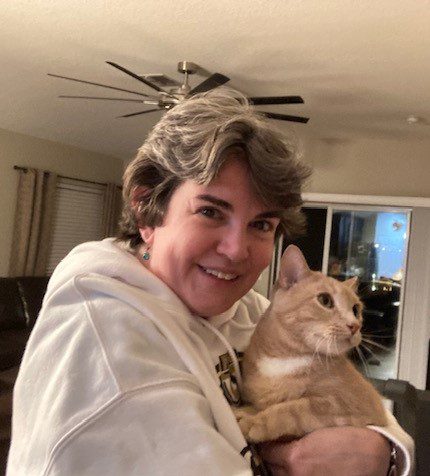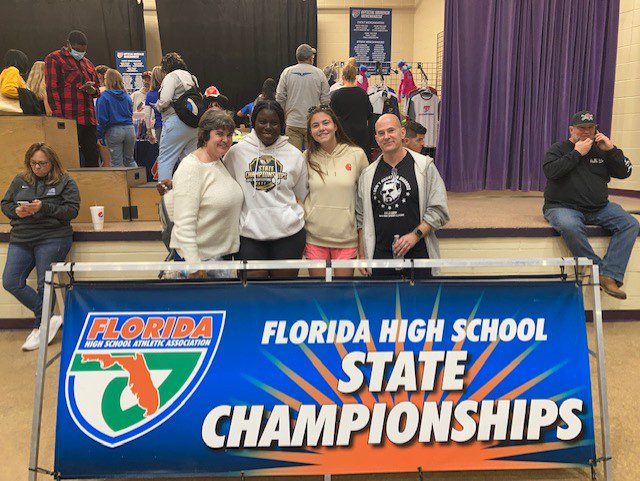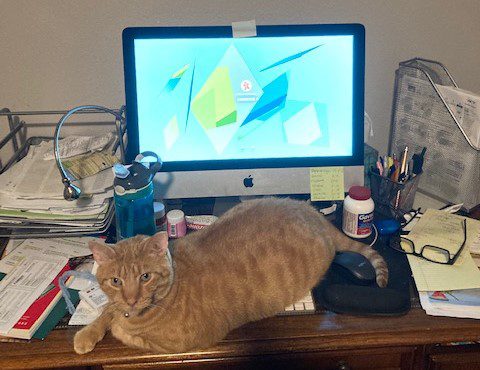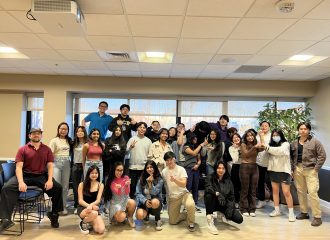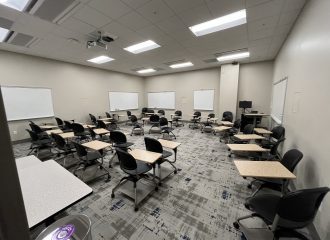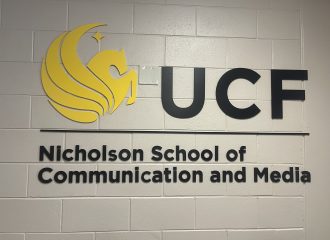By Rebekah G. Richmond
As the fall semester looms near — and a new academic year begins — there is just enough time to reflect on the closing academic year and what two semesters at the University of Central Florida has given me as a Transfer Knight. Last fall, I walked into UCF as a Transfer Knight through the DirectConnect program wielding a fresh Associate in Arts from Eastern Florida State College. Though orientation was incredibly helpful and filled with supportive people, I still felt lost. How do I get the accommodations that I need to thrive as a disabled student? Will they help me equally as a Transfer Knight? Moving from a comparatively small college, where it was easy to make yourself present, to a gigantic university where it is easy to make yourself scarce is a tall order. The real orientation came when I spoke to my advisor for the first time, a virtual face-to-face with someone who would give me the real talk and help me understand what to expect and who to speak with.
I reached out to the English department with haste and Dr. Kathleen Hohenleitner, Senior Lecturer of University of Central Florida, responded and helped me find my footing on this new ground. She spent hours working with me, getting to know my interests, and finding the best possible courses for me on very short notice. I was surprised to find that I could talk to her about anything, including the troubles of being a Transfer Knight.
Some of the questions I had were, “What’s acceptable in a university setting?” Is it okay to just e-mail people if you are better as a written communicator, like me? What do you know about these classes?
First off, the answer is yes: if you are better written communicator, write. E-mail advisors whenever you have a question. If they don’t have the answer, they can direct you to someone who does. They are the directors of your network. They are the readers of your writing when you need an objective pair of eyes. E-mail, e-mail, e-mail! E-mail is helpful for me because I sometimes become non-verbal when overwhelmed. If I cannot speak aloud, Student Accommodation Services is there to represent me when I need assistance.
I had the opportunity to interview Dr. Hohenleitner, which was a privilege and a joy, as anyone who has worked with her before might expect. I hoped to better understand what it means to be a college professor and an advisor. She is the consummate English buff, a lover of cats and books. She is also an excellent role model for student and faculty involvement, always taking the time to get to know other students. Almost any time I have mentioned her to another student, I am told that Dr. H helped them too. Each time, it is unsurprising — Dr. H is dedicated and kind. She is also the realist in the room, encouraging me to go for a minor in Technical Writing to ensure that I have a backup in case a position in education does not work out. The following is a transcript of our interview — some of it from her writing, some of it from my notes.
How did you get into studying literature?
No fun story there. I just loved to read—like all us English majors! I’m from Philadelphia, and I love most things related to Philly. I pulled a book off the shelf in my public library as a teenager called Philadelphia, Here I Come! and I ended up researching the playwright, Brian Friel, in great depth and really became interested in Irish literature.
What do you like to teach most and what inspired you to teach?
I thought I’d want to teach my research, but oddly enough, I most like to teach the intro classes, like Theories of Literature and Researching about Literature, because it helps students who are just getting to upper-level classes. I like being able to poise them to excel now that they’ve arrived at UCF. I also like classes like that permit us to use contemporary pop culture for examples. Often in my face-to-face classes, the students end up teaching each other using pop culture references I’m not familiar with. That is fun to witness.
What is your favorite thing about advising?
I really did love advising, but it’s time for me to do other things now. I like talking to students individually and hearing where they are coming from. It’s exciting to see so much potential and to hear such creative paths various students propose. I like talking to a student to find out what they are most invested in, and then brainstorming career paths that will permit them to pursue what they care about using the skills they’ve acquired in college.
Of course, some just seem to not want to be realistic. For example, they might want to go directly to a PhD program without an MA, which is not possible in many cases, and that can be frustrating. With them, I have to be willing to let them learn from doing it their way.
I have to accept that I can’t help everyone and that everyone won’t acquire their dreams on the first try, but that they can still learn a lot in the effort to do so.
And I have to be careful not to impose my biases on them. If I could do it over, I would not go to graduate school. But that’s not fair to assume the same will be true for all students.
But I do love it when a student will email me and say, “Here’s something I just published,” or “Here’s my work in the latest Cypress Dome.” It’s wonderful to read student work.
What are some of your favorite hobbies?
Well, I enjoy attending high school girls’ weightlifting meets because my daughter is a state champ in that. And I read a lot—no surprise there. I have way too many cats. I had to stop fostering cats because I kept adopting them instead.
Do you have any advice for incoming Transfer Knights?
Try new things. Take some courses outside your major. You might find a secondary field of expertise. Take a class you think might be beyond you! Stretch yourself. Nothing is sadder to me than a student who is so afraid to get an A- that they limit themselves to subjects they think they can excel in. Take on the challenge; you will amaze yourself with what you can do! Don’t let your self-esteem be tied to your GPA.
I don’t trust anyone with a perfect GPA, because it suggests that they may not have stretched themselves.
This is the time in your life to go out on a limb; try out new ideas. Employers like competence and reliability, but they also like diversity of thought and talent. Don’t be afraid to be you.
What are some of the upsides of teaching?
When it goes well, teaching can be the best job around, but often when it goes well, it’s because of student engagement. Sometimes I can plan something very carefully, and the students just don’t engage; other times my plans go awry, but I can see learning happening when I read the essays and realize that they did grasp the concepts I was trying to convey to them.
Circling back to your remarks on students teaching each other, I remember your American Dramas class being incredibly exciting on that front.
Are there any moments in particular that come to mind?
Yes, that assignment which invited students to collectively read a scene from one of our plays helped to quash a tiny bit of the alienation COVID inflicted on us. It was fun to watch the performances and it helped us see the performance end of plays. (Author’s Note: I can think of how I laughed until I cried when I did that assignment. My group was so relaxed and so fun, and the assignment was super creative.)
What are you grateful for at UCF?
What am I grateful for at UCF? I’m grateful for the past 24 years of getting to talk about books every day. I’m grateful for the wonderful students, the cool birds, plants, and trees on our campus that make it a pleasure to walk around each day. I am grateful for the diversity of our campus, where my computer science-focused son can find his people, and my humanities-minded son can find his place too. And I sincerely hope my daughter who is interested in nursing can find her place here as well.
It’s a privilege to teach here, and I’m grateful for that opportunity.
So many of my friends from graduate school were not able to find academic jobs. I consider myself very fortunate.
Any other remarks?
To add on to the point about the rapport with advisors or any faculty, a particular pitfall of online students is that when I’m asked to write a letter of rec or give a phone recommendation for a student I’ve never met in person, it’s difficult. If the student has never emailed me, or attended Zoom office hours, or permitted me to get to know them in one way or another, the letter inevitably sounds generic. I had a call from one of those government offices that requires security clearance. FERPA prevents me from saying which one, but they asked me all kinds of questions about a student I knew for one online class. I could not answer the questions. I felt like I was letting the student down—and the government. And I’m sure the student was perfectly qualified to do the job; I just had very little evidence of that to share with this interviewer because I only knew the student online. They asked things like “when did you see them solving a problem” or exhibiting leadership, etc.
I would not refuse to write a letter for a student unless they were really awful, like plagiarizing or bullying someone in class. What I mean to say is that online students don’t get to know their professors as well as the face-to-face students unless they reach out and attend Zoom office hours or study sessions, or simply email their professors.
It’s difficult to write a letter for a student you’ve never met in person (or on Zoom or email) because you can’t add any details that are unique to that student. I like to be able to say things like “this student is always willing to take a leadership role in group work” or “this student was really good at recalling where quotes were in a text in class discussions.” That’s more difficult online. Sometimes a company will ask me, “did the student show up on time for class?” and that’s another one I can’t really answer online. The best I can say is that they submitted their assignments on time.
Simply put, Dr. Hohenleitner is a generally inspiring person, the sort that gives you immediate hope with a hearty dose of realism. Spending time with the person behind the creative assignments has made me more grateful for the countless hours she puts into her work and her students. Without her, I would have been directionless; but she seemed to either know or know of everybody in the school. She read me like a book and helped me find some balance as a student. Emily Dickinson once said,
“Success in circuit lies.”
It is true; knowing everybody and knowing them as well as you can is a key to success as a student. Being unafraid to reach out to professors and advisors (even if your legs feel not-so-secretly frozen) is the trick. To this day, although she is no longer my professor or advisor, I am grateful for Dr. Hohenleitner. Also, I am grateful for her cats — if Dr. H didn’t already make my day with our interview, the kitties certainly did not hurt it.
Thank you, Dr. Hohenleitner, for your wonderful and detailed interview, your photographs, and everything related to being a student at UCF. I am eternally grateful for you.

